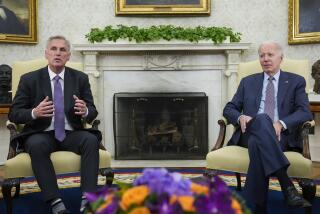‘We’re Almost There,’ Reform Duo Knows
- Share via
WASHINGTON — Though there was no final vote on their campaign finance reform bill Thursday, there was something of a victory parade for Sens. John McCain (R-Ariz.) and Russell D. Feingold (D-Wis.).
After beating back one last major amendment that threatened to undermine their bill, they bounded out the Senate chamber doors, waved off applause from Capitol Hill tourists and stopped to hug Granny D, the 91-year-old protester who has been walking circles around the Capitol in the name of reform. As they stepped into the glare of waiting television cameras, Feingold smiled and exhaled, “We’re almost there.”
Indeed, after five years of setbacks, McCain and Feingold are on the brink of winning passage of the most far-reaching campaign finance overhaul in a generation--legislation that might still be nowhere were it not for an uncanny alignment of political forces.
“It’s been like tectonic plates, shifting and moving over time,” said Fred Wertheimer, president of Democracy 21, an advocacy group pushing for reform. Finally, he said, “the plates have touched.”
The forces ranged from rising public disenchantment with a fund-raising system increasingly dominated by big checks to McCain’s surprising success in capitalizing on the reform issue during his unsuccessful presidential bid.
But perhaps the biggest tectonic plate fell into place in the bizarre election of 2000, which created a 50-50 party split in the Senate and gave backers of reform enough votes to push through their bill.
While most people were fixated on the presidential contest that would not end, there was also a congressional cliffhanger. It wasn’t until weeks after election day that Maria Cantwell, a pro-reform Democrat, was declared the winner of a Senate seat in Washington state by a mere 2,229 votes out of 2.5 million cast.
It was a crucial win for backers of reform. Cantwell was one of four new senators supporting reform who succeeded four senators who had opposed it. A month later, McCain announced he had picked up another supporter, Sen. Thad Cochran (R-Miss.).
McCain long believed he had enough votes to pass reform, but didn’t have the 60 votes needed to end filibusters. With Cochran, he was able to force Senate leaders to let his bill reach the floor in the reform debate that began last week.
The McCain-Feingold bill, now poised for final passage Monday, would outlaw the six-figure checks that parties collect by the bushel in contributions known as “soft money.” The bill would place new limits on ads that independent groups often use to attack candidates late in an election season. In exchange, it would raise limits on direct contributions to candidates.
The legislation still faces major obstacles, including negotiations with House leaders who have already indicated their intention to make a number of modifications. But both sides agree that campaign finance overhaul is now closer to becoming law than it has been since a series of Watergate-era reforms in 1974.
Public support for reform grew in the wake of a number of fund-raising scandals leading up to the 1996 presidential election, ranging from former Vice President Al Gore’s event at a Buddhist temple to revelations that then-President Clinton was hosting sleepovers for major donors in the Lincoln Bedroom.
The issue also gained steam as the amount of soft money flooding the system soared. In 1992, total soft-money contributions to both parties totaled $86 million. By last year it was nearly $500 million.
But campaign finance reform had never been much of a political weapon until McCain trumpeted the issue during his “Straight Talk” bid for the White House.
Many believe McCain’s zeal for campaign finance reform can be traced to his own narrow escape from scandal. In 1990, McCain was tarred as one of the “Keating Five,” the senators accused of interceding with federal regulators on behalf of Charles H. Keating Jr., a savings and loan operator who was ultimately jailed.
After a lengthy ethics investigation, McCain was found to have done no more than “exercise poor judgment.” But he had seen how quickly a reputation can slide from war hero to seedy pol.
“I don’t think there’s any question that has been a factor for John in his pursuit to reform the system,” said his closest friend in the Senate, Sen. Charles Hagel (R-Neb.).
Feingold has always cultivated an image of scrubbed propriety. In his first Senate campaign in 1991, his ads showed him conducting a tour of his ranch home, flinging open a closet and saying, “No skeletons.” Elected in 1992 at age 39, he arrived with a crew cut, and observers often compared him to a Boy Scout.
Their alliance began with an out-of-the-blue call from McCain to Feingold in 1994. McCain suggested that while they had little in common ideologically, they might work together to improve “the system.”
Their first effort was a 1995 proposal to severely limit free meals, complimentary tickets, expenses-paid vacations and other gifts. It sailed through swiftly. But the two spent the next six years just trying to get their broader reform bill to the Senate floor for the debate that began last week.
More to Read
Get the L.A. Times Politics newsletter
Deeply reported insights into legislation, politics and policy from Sacramento, Washington and beyond. In your inbox twice per week.
You may occasionally receive promotional content from the Los Angeles Times.










